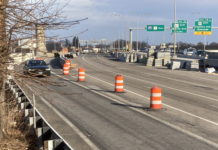
BOSTON – The Massachusetts Bankers Association is urging consumers to be wary of ATM skimming, a type of theft costing banks and customers about $3 billion per year, according to FICO.
ATM skimming is when lawbreakers steal credit or debit card information using fake card readers at ATMs or gas-station pumps. The fake readers – which look like real machines but actually skim your personal information off the cards – are used with tiny cameras that record customers entering PIN numbers.
The stolen card information is then applied to fake cards, which are used to spend money from accounts, according to Mass Bankers.
“The theft can occur almost anywhere, but consumers should be particularly vigilant at gas pumps and nonbank ATMs,” said Daniel J. Forte, president and CEO of Mass Bankers. “The good news is, if you know what to look for, you can avoid such transactions, and if you do happen to be defrauded, report it as soon as you are aware of it and you will be protected by your bank.”
The Boston-based association offers the following tips to help customers avoid and detect skimming:
- Talk to your bank about card security. Most banks already have in place security checks to monitor out-of-region use of your card. Ask about other protections.
- It helps if you use the same ATM regularly. That way you might notice if anything looks different. When using a non-familiar ATM, or at the gas pump, keep an eye out for anything that looks suspicious, like an off-kilter or taped-on reader. Look for that tell-tale pinhole on the machine, or a new camera behind you.
- When using the keypad, cover it up with your free hand – that’s the best protection you have. (There is also another insidious and sophisticated scenario that consists of a keypad overlay to record your PIN, but that too might look like an overlay.) If you spot any of this, report it immediately to your bank or the local authorities.
- Checking your account regularly can help tremendously. You have fraud protections in place from your financial institution, but only if you report suspicious activity on a timely basis.
- In a restaurant, ask your server if he or she can do a card transaction in front of you.
- Ask your bank to temporarily freeze your card if you suspect that someone else other than you is making transactions and, of course, your bank can issue a new card for you.
- If you use a debit card, ask your bank if it can put a threshold limit on your card. For example, if you have a $1,200 limit and somebody tries to make a larger transaction, the transaction would be declined.
- Ask your financial institution for a “chip” card. If it is available, the electronic chip is more secure and cannot be as easily replicated as the traditional “mag stripe,” providing a higher level of security. (The code on chip cards changes with each transaction.)












